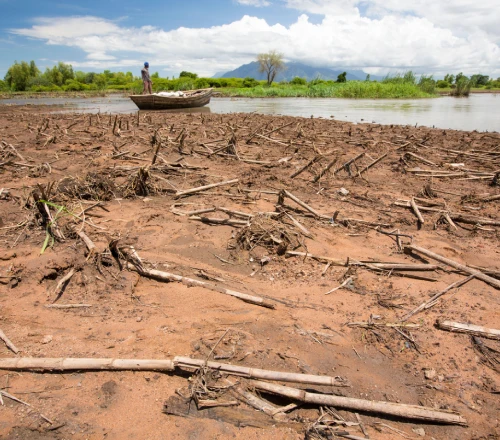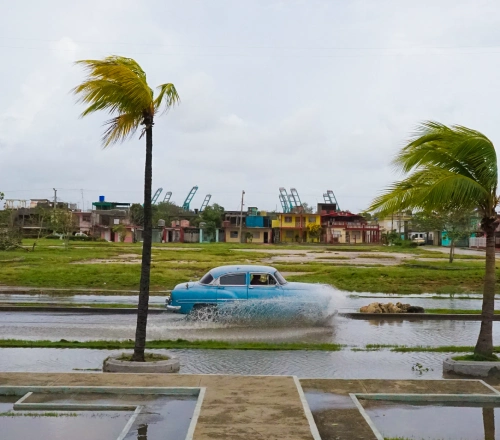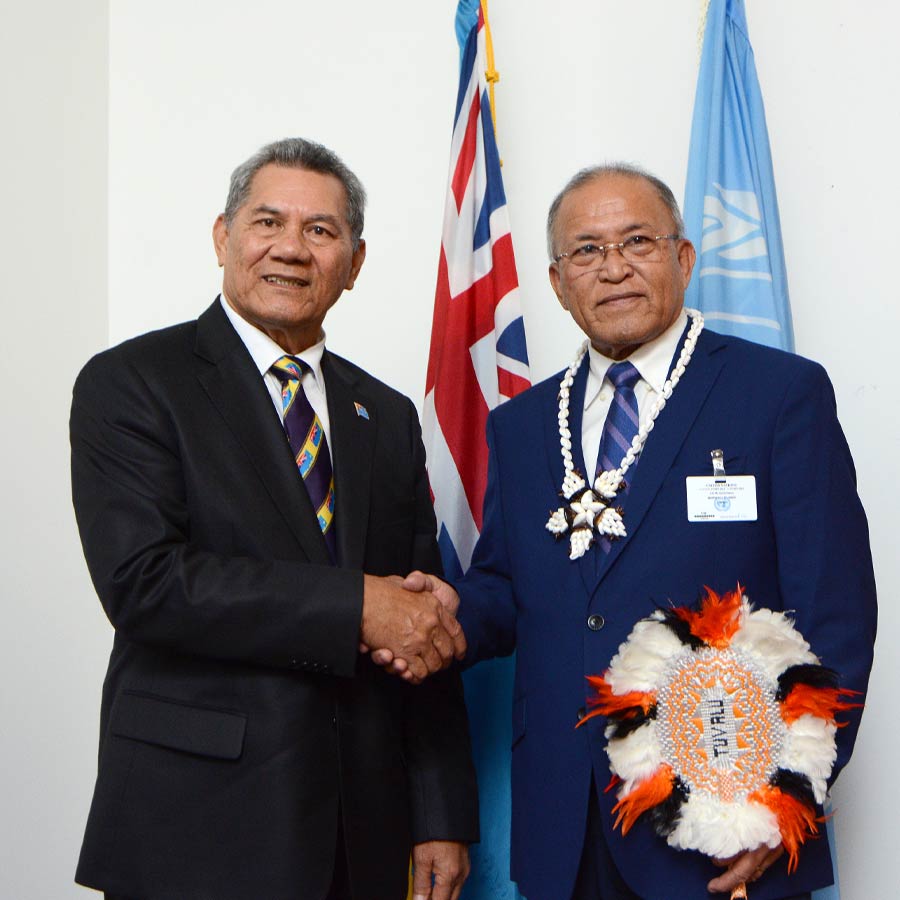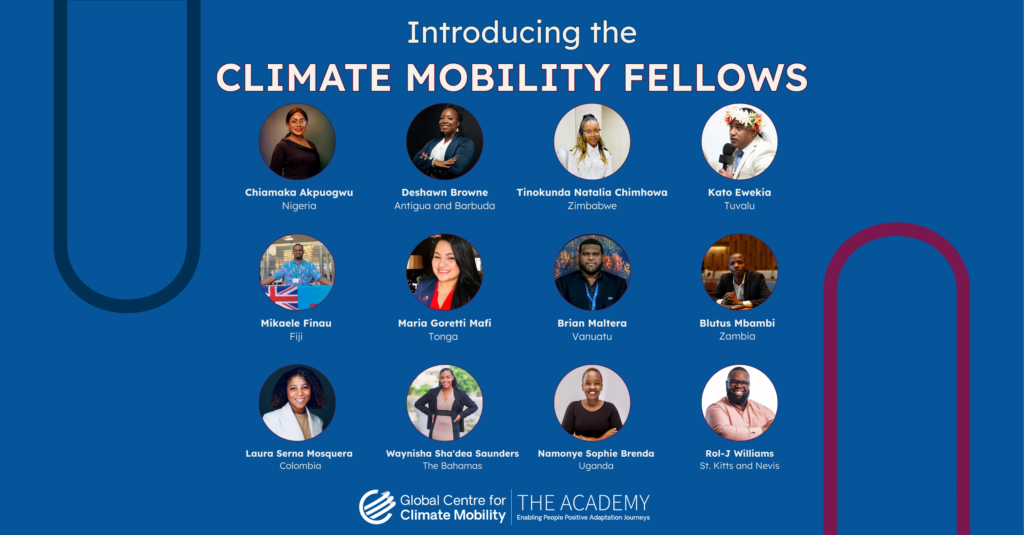May 8th 2025 — From a distinguished pool of over 6,000 applicants worldwide, twelve emerging leaders have been chosen to form the inaugural cohort of the Climate Mobility Fellowship. Hailing from diverse regions and professional backgrounds, these fellows are poised to transform the complex challenges of climate mobility into pathways for resilience and innovation.
The Climate Mobility Fellowship stands as a flagship initiative of the Global Centre for Climate Mobility (GCCM) and serves as a cornerstone of the newly launched Climate Mobility Academy. This pioneering platform fosters collaboration, learning, and knowledge exchange among key stakeholders in the climate mobility arena. Through intensive training, strategic tools, and global exposure, the Fellowship empowers promising leaders from Africa, the Pacific and Latin America & the Caribbean to drive climate action and promote positive adaptation journeys and resilience within their communities.
“The Climate Mobility Fellowship will help me grow as a leader and connect with experts who are working on the frontlines of climate change,” said Kato Ewekia, Climate Mobility Fellow from Tuvalu. “Together, we will learn how to turn challenges into opportunities for our communities.”
The inaugural Fellows bring an extraordinary breadth of expertise—spanning public policy, international law, climate activism, and human mobility. Over the course of the year-long programme, they will participate in immersive mentorship, gain direct exposure to high-level policy processes, and engage in global convenings such as the Berlin Climate Mobility Forum, the UN General Assembly High-Level Week, the Climate Mobility Summit, and COP30.
At the heart of their journey lies the development and implementation of Climate Mobility Impact Projects with each Fellow advancing solutions aligned with the programme’s core pillars: Preserving Heritage & Culture, Protecting Rights, Advancing Knowledge & Innovation, and Planning for Safe Pathways.
“We are investing in young leaders who not only understand the complex realities of climate mobility but who also embody the resilience, creativity, and conviction needed to forge meaningful change,” said Prof. Kamal Amakrane, Managing Director of the Global Centre for Climate Mobility. “When the tides of change threaten to uproot lives, it is visionary leadership that builds bridges—between people and policy, between urgency and action, between despair and hope. This Fellowship is a defining step toward cultivating a new generation—one that is inclusive, globally connected, and empowered to champion community-driven solutions to the climate crisis.”
The full list of selected fellows can be found here:
Chiamaka Akpuogwu, Nigeria
Migration researcher and trained lawyer exploring the intersection of climate change, displacement, and reintegration. Her work draws from academic research, field engagement with displaced communities, and personal experience in flood-affected Lagos.
Deshawn Browne, Antigua and Barbuda
An Attorney-at-Law and Crown Counsel in the Ministry of Legal Affairs, Deshawn advises on climate and mobility-related legal matters, including multilateral environmental agreements. She supports national climate policy development and interprets decisions from international judicial bodies such as ITLOS and the ICJ.
Tinokunda Natalia Chimhowa, Zimbabwe
A drone technology specialist, she provides aerial monitoring and environmental data to track climate impacts driving both rapid and slow-onset displacement. Her work supports resilience strategies for vulnerable communities facing drought, flooding, and rising sea levels.
Kato Ewekia, Tuvalu
A climate activist and government official, he supports youth engagement and policy work on climate mobility through the Rising Nation Initiative. He also uses Tuvaluan music to advocate for and preserve his nation’s cultural identity.
Mikaele Finau, Fiji
A Technical Project Assistant with GIZ, embedded in Fiji’s Ministry of Environment and Climate Change, he supports community adaptation and dignified planned relocation through the Human Mobility in the Context of Climate Change II project.
Maria Goretti Mafi, Tonga
Climate Project Manager and co-founder of Tonga Change Maker Inc, she leads youth-driven initiatives addressing climate-induced displacement through policy advocacy and community-based resilience strategies, drawing on her legal expertise.
Brian Maltera, Vanuatu
A climate resilience and Loss and Damage advisor, he works with communities facing displacement and helped revise Vanuatu’s Displacement Policy to integrate climate considerations. He coordinates the country’s first Loss and Damage project and contributes to the STRENGTH program.
Blutus Mbambi, Zambia
An ecology graduate student and Co-founder of CCCAA, he has shaped national climate mobility policy, led youth advocacy from COP26–COP29, and mobilized funding for resilience projects. His work spans policy, training, and displacement-focused climate action across Africa.
Laura Serna Mosquera, Colombia
A lawyer and climate justice advocate, she focuses on climate mobility through a justice-based lens. Her work spans environmental law, policy, and advocacy across Latin America, with emphasis on urban adaptation, resilience, and loss and damage.
Waynisha Sha’dea Saunders, The Bahamas
A Climate Youth Ambassador under the Office of the Prime Minister, she advocates for climate justice and youth-led policy in SIDS. She brings global experience in climate negotiations and training, with a focus on mobility, recovery, and inclusive action.
Namonye Sophie Brenda, Uganda
A Climate Change Officer with Uganda’s Ministry of Water and Environment, she supports national adaptation and mitigation efforts. Her grassroots work includes supporting flood-displaced communities through the Green Futures Initiative in western Uganda.
Rol-J Williams, St. Kitts and Nevis
A climate justice advocate and youth leader with a science background, he explores the intersection of climate change and socio-economic vulnerability. He recently supported efforts to integrate the SDGs into university curricula across the Caribbean.
For Media Inquires Contact: Jaclyn Licht, Strategic Communications Coordinator, +1 (781) 492-8513, licht@climatemobility.org
About the GCCM:
The Global Centre for Climate Mobility (GCCM) is a global partnership at the nexus of climate action and human mobility to enable positive adaptation journeys for people and communities at the frontline of the climate crisis, prioritizing their adaptive capacities and right to stay. It is enabled by the United Nations and advanced by champion countries, UN Agencies, the World Bank, and regional organizations with support from philanthropy, civil society organizations and research partners. The GCCM supports community transition in the most vulnerable regions through regional initiatives that enable countries and frontline communities to anticipate, plan, and design responses for climate mobility. The GCCM is advancing the Africa Climate Mobility Initiative, the Greater Caribbean Climate Mobility Initiative, and the Pacific Climate Mobility Initiative. It also enables the Rising Nations Initiative, which supports the Small Island Developing States in preserving statehood, protecting sovereignty, and safeguarding the rights and heritage. The GCCM is the secretariat for the Coalition for Addressing Sea-Level Rise & its Existential Threats (C-SET), the Ocean Rise and Coastal Resilience Coalition to be officially launched at UNOC3, and the Climate Mobility Elders Group (C-MEG) led by former Heads of State and Government and other eminent global leaders working together to advance people-centered climate action amidst the climate crisis.









